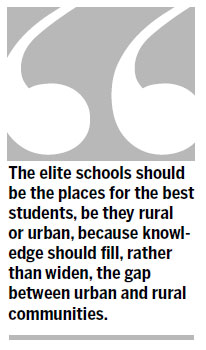Elite colleges must embrace rural students

Education has been a ladder of social ascendancy in China since ancient times and that is still the case today.
Higher education is the key to social mobility. Yet where a person is born has a significant bearing on their future success. Students from rural areas are at a distinct disadvantage in their schooling compared to urban students and for the majority of students in the countryside, enrollment at one of the country's top universities is still an unattainable dream.
Despite pledges by the government that education is one of its priorities, China continues to be a country where the best university education remains out of reach of the rural population. Students from the country's poor, rural areas are still largely excluded from the elite universities such as Peking University and Tsinghua University.
For the last five years, 97 percent of the national poverty-stricken counties have sent no students to Tsinghua University.
In fact although the government has lowered the financial barriers for primary and middle school education, for higher education rocketing fees now exceed most rural families' annual income many times over. The best and the brightest students from the countryside have to overcome ridiculous odds to pass the rigorous entrance examinations to go to college, only to find their dreams tragically shattered by the financial reality of tuition fees.
A survey by Peking University shows that China is seeing an increasingly large gap between the education levels of people holding urban and rural household registrations. The survey, carried out in Beijing, Shanghai, and southern Guangdong province, found that only 0.7 percent of the 2,732 rural respondents have university degrees or higher as opposed to 13.6 percent among the 3,253 urbanites polled.
The situation in the less developed central and western regions is likely to be worse.
Education scholar Yang Dongping, a professor at Beijing Institute of Technology, has studied the inequity of higher education in China and has found that students from the countryside are concentrated at ordinary universities or junior colleges.
Yang found that 62 percent of the students at community colleges in Hubei province were from rural backgrounds in 2007, whereas in the province's top universities, for every student from a rural or unemployed family there were 17 middle-class students whose parents were officials or civil servants. Biased against students from rural and poorer backgrounds, the elite universities encourage the wealth gap.
The ideal social mobility pattern is one in which more and more farmers and workers become members of higher social groups, increasing the middle class. Only after such a pattern is properly in place can China become a truly open society.
Yet at present China's wealth gap between urban and rural communities is among the highest in the world. Improving the educational level of people in rural areas plays an important role in raising their skill levels and ultimately their incomes.
The goal of China's top educators is to create an innovative, challenging and transformative system of higher education.
One only has to look at the United States to see what can be achieved. The rise in educational attainment since the end of World War II has been a remarkable success story in rural America. In 1970, 56 percent of the rural adult population did not have a high school diploma and only 7 percent of rural adults had graduated from college. By 2000, 16 percent of rural adults aged 25 and older had completed college and more than 75 percent had finished high school.
The elite schools should be the places for the best students, be they rural or urban, because knowledge should fill, rather than widen, the gap between urban and rural communities.
The author is a senior writer with China Daily. E-mail: caihong@chinadaily.com.cn


















